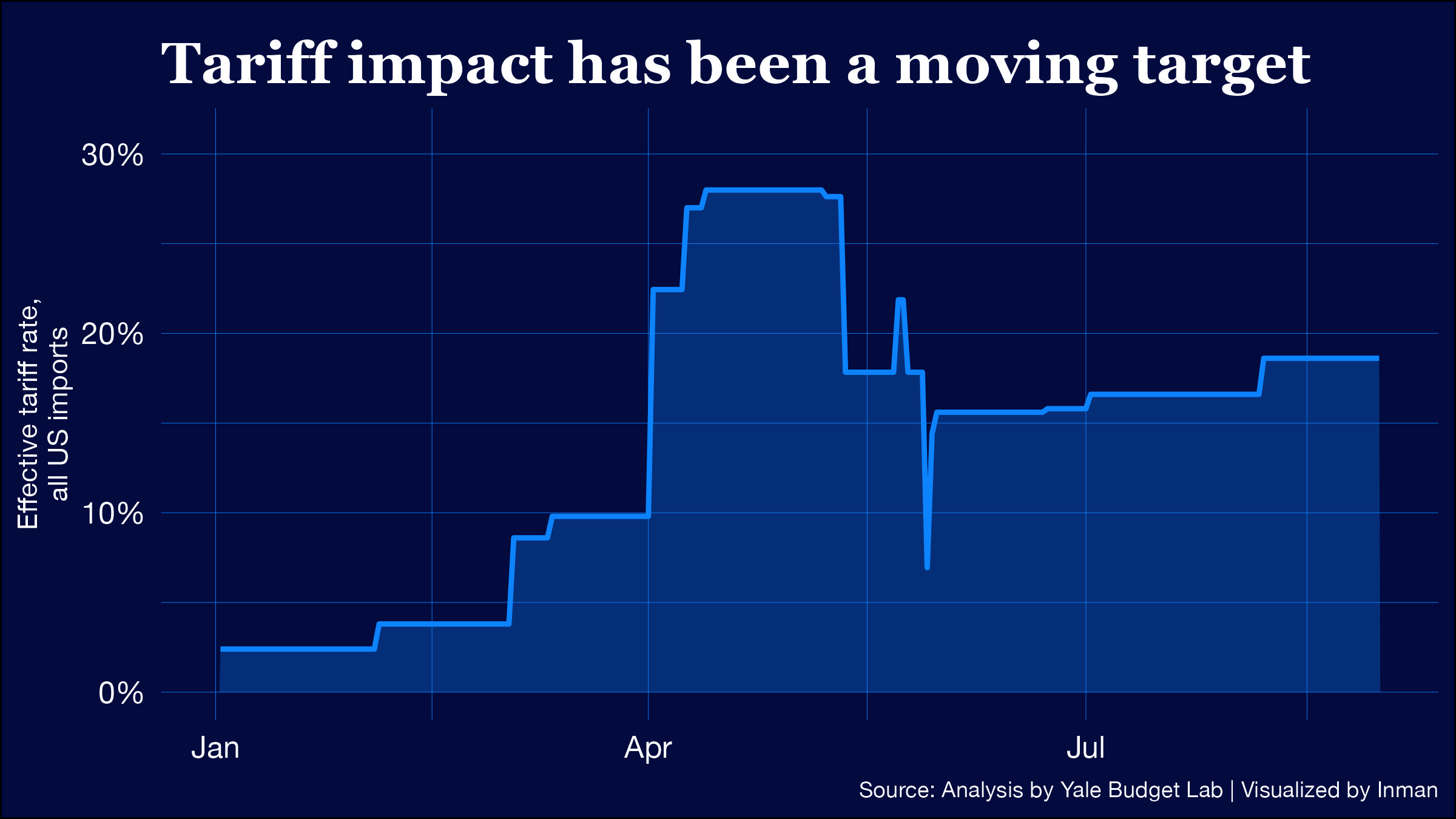Clients of real estate agents were more directly affected by tariff policy in July than in previous months as costs began to stack up for U.S. importers.
As the tariff-related anxiety that gripped U.S. consumers and financial markets in April continues to fade, the economy has transitioned to a new phase — one in which the actual impact of the tariffs is beginning to be felt.
And in July for the first time, this new phase began to see increasingly palpable effects on some real estate clients, Intel surveys suggest.
A small but persistent crop of real estate agents polled in late July as part of the Inman Intel Index survey continued to say that they’ve seen tariffs blow up a deal in their market. And the tariff-related causes that their clients have pointed to have become less speculative and more tangible in recent weeks, Intel found.
Although it’s early, these experiences line up with a review of data that confirms U.S. importers have begun to pay new taxes to the federal government that, if sustained, would amount to hundreds of billions of dollars per year.
And they reflect the earliest indications that those effects are finally starting to be felt on the housing market — at least on the outskirts.
Intel lays out what its recent surveys reveal about how tariffs are affecting the client-agent relationship, and what it means for future months, in this week’s report.
Delayed effect
For months, it wasn’t clear when — or whether — new U.S. trade policy would make a splash in a way that consumers and industries would feel.
Now, the general levels of tariffs that U.S. importers are expected to pay is coming into clearer focus.
The amount that U.S. importers paid in customs duties from April through June would, if maintained over an entire year, amount to $267 billion in annual tariffs, according to the U.S. Bureau of Economic Analysis. That’s up from an annual rate of $78 billion in the second three months of 2024.
Chart by Daniel Houston
The long-term level of tariffs that importers expect to pay has also stabilized since early April, when the White House announced higher tariff rates on almost every nation that it described as “reciprocal.”
Since then, the administration has announced a series of pauses that served to calm the business community as trade advisers attempted to hammer out new trade deals with other countries.
Still, tariffs have remained a central component of the administration’s new approach to international trade.
As of earlier this month, U.S. companies and consumers were set to pay an average tariff rate of 18.6 percent on imported goods, according to an Aug. 7 estimate by the Yale Budget Lab. While the tariff picture is changing by the week, that would amount to the highest rate paid since 1933.

Chart by Daniel Houston
And in the weeks leading up to that point, agents told Intel their interactions with clients had started to evolve — and take on more urgency.
A new phase
In some ways, the anxiety over tariffs has subsided as markets and individuals have adjusted to the idea.
That’s true for many real estate agents as well.
- 61 percent of the agents Intel surveyed in July said they were concerned about the U.S. economy, compared to 75 percent who said the same in April, a few weeks after the reciprocal tariffs were announced.
- The share of agent respondents who said they were “very” concerned about the economy dropped from 37 percent in April to 23 percent in July.
Over the past three months, the share of agents who told Intel they had seen tariffs sink at least one recent deal in their market has barely changed.
- 21 percent of agent respondents in July told Intel that they had seen at least one sale fall apart due to tariffs — the same share as when Intel first asked this question in May.
- Among all agent respondents, 13 percent said that tariffs were the reason behind one of their own clients backing out of the market, while another 8 percent said that they had seen it happen to another agent’s client.
But within these numbers, a clear pattern emerged: Agents who have seen a deal blow up because of tariffs say it’s not for speculative reasons anymore. Things have gotten real for their clients.
- Among the agents who had seen a deal blown up, the share who said it was because a client lost a job in an industry reliant on international trade rose from 18 percent in May to 32 percent in July.
- 45 percent of these agents told Intel in July that a recent client had cited rising household expenses from new tariffs as the reason behind the lost sale, up from 26 percent of this group two months earlier.
- The share of this group that said a client backed out of a search for new builds because of increased material goods costs rose from 21 percent in May to 27 percent in July.
- And conversely, fewer agents in July said that a sale fell through due to lost income from a stock investment portfolio, or merely due to concern about how tariffs might affect them in the future.
While the overall effect on the broader housing market remains small for now, it’s clear that the issue has taken on more immediacy for many clients and agents. Intel will continue to track these trends in the months to come.


